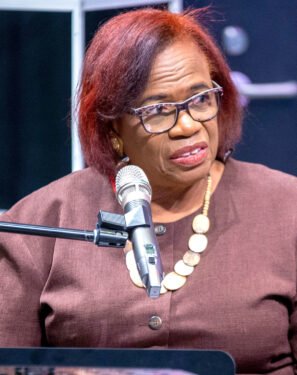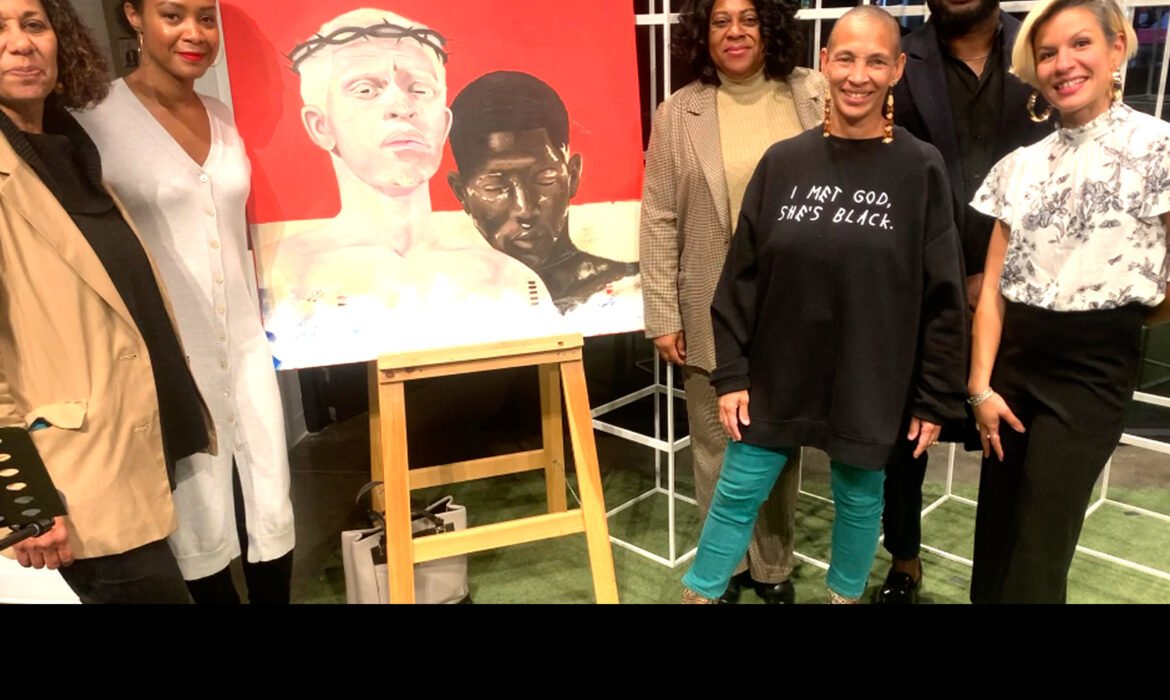“Today, we must recognize how institutional racism manifests itself, not just historically, but in the current reality of our education systems, including higher education.”
The words of Graham Carr, president and vice-chancellor of Concordia University, on Friday, October 28, as he delivered a formal apology on behalf of the institution and its board of governors “for the decisions and actions of university leaders at the time,” which contributed to a series of events that became known as the Sir George Williams Affair.
In the early morning of February 11, 1969, officers of the Montreal police force responding to a call from university administrators, entered the computer center on the ninth floor, and violently arrested 97 students including dozens of Black students who were there in protest of what was identified as institutional racism at the time.
Carr also zeroed in on the outcomes of the police action that morning:
“Those arrests and the suppression of the protest had serious lasting consequences for many individuals. These ranged from jail sentences to deportation, psychological trauma, physical injury, social alienation, loss of employment and the disruption of — even to the point of not finishing — academic degrees.”
The apology coincided with the release of the final report Concordia’s President’s Task Force on Anti-Black Racism that was put in place in fall 2020 “to generate recommendations to address systemic anti-Black racism across university life.”
Angélique Willkie an associate professor in the Department of Contemporary Dance, currently serving as Concordia’s special advisor to the provost on Black integration and knowledges chaired the Task Force which generated a laundry list of recommendations centered around Black flourishing, inclusive excellence, mutuality and accountability, which are the four foundational principles of the Scarborough Charter on Anti-Black Racism and Black Inclusion in Canadian Higher Education.
That charter was developed in 2020 out of a national conversation on anti-Black racism and Black inclusion by Canadian universities, colleges, and other partners to facilitate change in higher education and in communities and Concordia is one of more than 50 signatories.
Willkie told the CONTACT that the university coming to terms with the past and the recommendations tabled by the Task Force that will help chart a path forward on inclusion and other of anti-Black racism issues are intrinsically linked.
“The most important thing for me was to make sure that the recommendations were anchored in the apology,” she says. “If we didn’t focus our attention on the impact of the events of 1969… also the fact that many people in the university aren’t even aware that that incident took place…if we don’t look at our history, then it doesn’t help situate us now and give us the kind of platform that we need in protecting ourselves further.”
She says an apology does not stand by itself “without stating clearly the actions we want to take to improve the experience of Black faculty and the way we approach knowledge at the university.”
She says it’s really about “looking at the continuum of Black presence at the university” and some of the issues that have always been there.
According to Willkie “transparency and accountability” are going to be key going forward.
As provost and vice-president of Academics, Anne Whitelaw has been integral in put together the task force and is central to the implementation of the recommendations.
She told the CONTACT that as part of a new set of administrators they have a better understanding of the role that racism played in the events of 1969 through the work of the task force as well as the research generated by “The Protest and Pedagogy” exhibition that marked the 50th anniversary of the Sir George Williams Affair also the film “The Ninth Floor.”
“Our understanding better the events and the legacy of 1969 and the racism that motivated that event allows for a broader understanding of the structural racism that is embedded within the university.”
The event to launch report of the Task Force and the apology was staged at Concordia University’s 4th Space on De Maisonneuve Ave. downtown and audiences heard from two guests who were students and integrally linked to the events of 1969.
Rodney John originally of St. Vincent and The Grenadines attended Sir George Williams between 1965 and 1969, was one of the initial six students who lodged a formal complainant to his Biology professor, Perry Anderson for perceived biases in his grades.
And Lynne Murray, a Montrealer who was pursuing her bachelor of arts in 1969 was one of 43 Black student among the 97 that were arrested by police on the morning of February 11, 1969.
John outlined what referred to as irrefutable evidence of Anderson’s bias against students and justifies their complaint and subsequent occupation of the computer lab for 124 days and nights.
He said the only reason he was not arrested is because he left to be at the side of his wife who had recently delivered their child.
He returned to Concordia in 1972 and completed a different degree and went to earn several higher degrees from other institutions.
Murray documented the horror of the police intervention and the brutality that was meted out against she and other students that were arrested that morning. She also used the occasion to remember the many individuals and groups of different nationalities and cultures that participated in that collective stand against injustice in 1969. (See her speech and the apology in their entirety attached.)
Whitelaw, the provost, also spoke at the event outlining the university’s commitment to implementing the recommendations, some of which indicated to the CONTACT are already being put into place.
Include among those
recommendations are:
• Hiring a faculty member to lead program development in Black and African Diaspora Studies in the Canadian Context.
• Building new relations with Black communities that are interested in partnerships.
• Installing a plaque in the Henry F. Hall Building and launching a commemorative webpage to ensure that the 1969 student protests and protesters are remembered and that current and future Concordians know this history.
• Providing anti-racism training and supports across the university, including equipping managers and hiring committees with tools to address implicit bias in staff and faculty hiring; and providing context-specific training for units across the university, including senior administration.
Concordia University’s Formal Apology on the Sir George Williams Affair
 The work of the Task Force on Anti-Black Racism has led us to examine Concordia’s history as well as the relations of its founding institutions — Sir George Williams University and Loyola College — with Black communities.
The work of the Task Force on Anti-Black Racism has led us to examine Concordia’s history as well as the relations of its founding institutions — Sir George Williams University and Loyola College — with Black communities.
We are determined to look honestly at our past as an institution in order to build trust and move forward to a better future.
One critical thing this means for
Concordia, is that we have to directly address the student protest that took place at Sir George in 1969, as well as its aftermath.
The protest was triggered by complaints of racial discrimination made by six Black and Caribbean students against a university professor. These complaints were largely ignored, mismanaged and dismissed. For months, the students pursued many channels to be heard but they were met with inaction by the university and told that their complaints were not legitimate.
After almost a year of the university refusing to address Black students’ concerns about their experiences of racism on campus, a large group of students occupied the university’s computer centre and faculty lounge to bring attention to the issue.
The protest brought the topic of institutional racism to the forefront of the university. It also galvanized people far beyond campus, both in Montreal and the rest of Canada, as movements to address racial and social injustice were taking place across the world.
In response to the occupation of the Hall building, university leaders called the police. That decision led to the arrest — in some cases the violent arrest — of 97 students. Those arrests and the suppression of the protest had serious lasting consequences for many individuals. These ranged from jail sentences to deportation, psychological trauma, physical injury, social alienation, loss of employment and the disruption of — even to the point of not finishing —
academic degrees.
Sadly, the university’s actions and inactions were a stark manifestation of institutional racism. The adverse effects of that behavior reverberated widely, not just in Black communities in Montreal but also beyond, particularly in the Caribbean, where several of the Sir George students were from.
Concordia University, with the support of its Board of Governors, apologizes for the decisions and actions of university leaders at the time. We also apologize for the harm that was caused to Black students at the university and for the negative impact felt by Black communities in Montreal and beyond. We recognize the deep and often dire consequences that the actions of the university had at the time, and how these consequences have continued to echo through the years.
In addition, we deeply regret our silence in the decades since the protest. That silence has contributed to a deterioration of trust and a breach in Concordia’s ties with Black communities. It should not have taken more than fifty years to acknowledge the wrongs leading up to, and in, 1969.
Today, we must recognize how institutional racism manifests itself, not just historically, but in the current reality of our education systems, including higher education. This also means taking stock of the lasting effect that systemic racism has on students and communities beyond the university. We must be committed to ensure that institutional racism is confronted so that events such as those of 1969 are not repeated.
For Concordia, reckoning with these events is a long overdue, necessary step. But it is not an end in itself. Yes, this public apology reflects our need to question past ideologies and past acts. It also holds us accountable to do better and reflects our commitment to strive every day to be a community where everyone can feel that they belong, where everyone’s experiences are considered legitimate, and where,
consequently, we can all reach our full potential.
Looking forward, the Task Force on Anti-Black Racism has recommended specific, meaningful actions that will guide us on this path. The Task Force has worked over the last two years to generate recommendations anchored in the lived experiences of Black faculty, staff, students and alumni. The measures it has put forward span most aspects of university life. They aim to improve our governance and policies, promote academic excellence and a thriving campus community for Black students, and support Black faculty and staff. Equally, they aim to encourage Black knowledges and nurture mutually beneficial relationships with Black communities beyond the university.
Now we begin the hard work of delivering on these recommendations and strengthening our relationships with Black communities, on
campus and in Montreal. As you bear witness, we reach out to everyone at Concordia to be partners in building a more equitable and just
community.
Graham Carr
President and Vice-Chancellor
Concordia University
Lynne Murray Responds To The Apology
 I’m representing the Caribbean students who could not attend this important function today.
I’m representing the Caribbean students who could not attend this important function today.
They include: Terry Ballyntine, Bukka Rennie, Hugo Ford, Mark Chang and Paul Keens Douglas from Trinidad and Tobago. Also, Hardley Marshall from Barbados. Doctor Cheddi Jagan from Guyana. And John Cato from Saint Vincent.
We also remember those former Sir George students who have passed on: Cora Lee Hutchinson from the Bahamas; Valerie and Teddy Belgrave from Trinidad and Tobago; Leroy Butcher from Saint Lucia; Kelvin Robinson from Trinidad; Keith Burns from Guyana; Douglas Moscah from Jamaica; Errol Thomas from Saint Vincent; Allan Brown from Jamaica and Roosevelt
Douglas from Dominica.
There are many others that I failed to mention today. They will not be forgotten and may they continue to rest in eternal peace.
After six weeks of protesting and meeting with the university administrators, the students took over the computer centre in a peaceful protest.
During the first week of February 1969, the university admin finally agreed to the students demands and racism in the university.
The majority of the 400 plus students who protested and occupied 9th floor left and went home because an agreement had been reached.
But a few remained to clean up the centre and also monitor the computers, which the students had
maintained during that whole occupancy. At that time, computers were relatively new and we’re not the compact and desktop that we have now. These were large mainframes that took up most of the rooms and always had to maintain a certain temperature for them to be effective.
February the 11th, 1969 was a dark day in the history of Montreal.
Ninety-seven students were arrested and 42 of them were Black. Many students, including myself were beaten and tortured by the Montreal police.
Students were forced to lay down on broken glass on the floor and were beaten with clubs.
There are photos in the media of a lot of students being led to the police in paddy wagons or vans and they were bleeding and bruised with cuts. In fact.
One of the students from Bahamas suffered a brain aneurysm and she died shortly after and her parents believe it was because of the actual beating that she suffered that day.
We suffered humiliation and shame.
The indignity and painful scorn from family and friends. We were incarcerated and branded as criminals. Taken to court in police vans in handcuffs, like criminals. And why?
Because we protested against the racist actions of Professor Perry Anderson who directed all his racist attacks at only Black students.
In addition to this, was the deliberate misrepresentation an indifference of the university’s administration.
All the students suffered mental anguish. Some students were on scholarships, which of course, were last. There were lost of funding. Limited funds for tuition now had to be directed to mount a legal defence.
Many had to seek multiple jobs in the hope of clearing their name and from the stigma of being branded a criminal. And also for them to continue their studies, so many had to seek employment.
Another thing, whenever you were traveling whether to the US, Europe, Canada, you have to apply for a visa, there was always a hesitancy on the students behalf when one of two questions is typically asked. Have you ever been arrested or detained? Do you have a criminal record? All of these things the students had to bear.
This impacted on their freedom and movement. Their ability to seek and hold employment and to seek a quality of life for themselves and their families. The stain of a criminal record was tattooed on their lives forever.
For standing up for their basic human rights and dignity. Thank God, the majority of the students successfully graduated from other educational institutions and later became pillars and stalwarts within their own communities and countries.
They became teachers like Hartley Marshall from Barbados Teddy Belgrave. Social worker Hugo Ford. chartered accountant Mark Chang. Authors like Bukka Rennie, Paul Keens Douglas. Valerie Belgrave deceased. Lawyers like Terry Ballyntine. John Cato, doctors like Dr Chedi Jagan; a judge, Errol Thomas who recently passed and a prime minister of Dominica named Mr. Roosevelt Douglas.
In closing, I would like to thank and recognize. All of the allies who were with us arm-in-arm and
throughout this ordeal. This includes the white students as well, because there were a lot of white
students at Sir George who assisted and supported the black students in 1969. Many were arrested with us and their valuable support was greatly appreciated in our efforts to achieve justice.
I also want to thank the McGill students in 1969. Aussi les etudiants de Universite de Montreal. The
0members of the Jewish Defence League. Members of the Nation of Kanawake; Caribbean Associations in Montreal. Social activists and supporters in the Black community. Businesses and restaurants that donated food and funds during the protests and sit in on the 9th floor.
All these groups and organisations were extremely supportive in our struggle against systemic racism in the university.
And lastly behalf of all the former students, I thank the president, chair, and all the members of the task force for their exemplary action and apology.
These are initial great steps towards making amends. And atoning for the past, but these plans you share with us today must be implemented and fully executed and also publicly demonstrated.
These hallowed halls are here to promote higher learning in an environment devoid of prejudice
intolerance etc. There should always be recourse for everyone within the university environment,
including students and tenured professors whenever actions and behaviors or out of bounds of basic dignities and respect.
Ladies and gentlemen, I thank you.
Ms. Murray was a student at Sir George Williams in 1969. She spent several weeks in prison after her arrest. She went on to earn a degree in business at McGill University.













